Leadership and Management for Service Industries: A Detailed Review
VerifiedAdded on 2021/02/19
|11
|3637
|61
Report
AI Summary
This report provides a comprehensive analysis of leadership and management within the service industry, using Travelodge UK as a case study. It begins by exploring classical management theories like scientific management, administrative theory, and bureaucracy theory, contextualizing their application within the service sector. The report then delves into the role of leaders, examining various leadership styles such as directive, supportive, and participative leadership, and their impact on employee motivation and performance. Furthermore, it reviews the management and leadership styles employed by Travelodge, evaluating their effectiveness. The report also identifies internal and external factors influencing management styles and structures, including diversity, stakeholders, globalization, and technological changes. It assesses current and future management and leadership skills required by the service sector, highlighting the importance of both hard and soft skills. Finally, the report compares different service industries, drawing conclusions about the evolving needs of leadership and management in this dynamic sector.
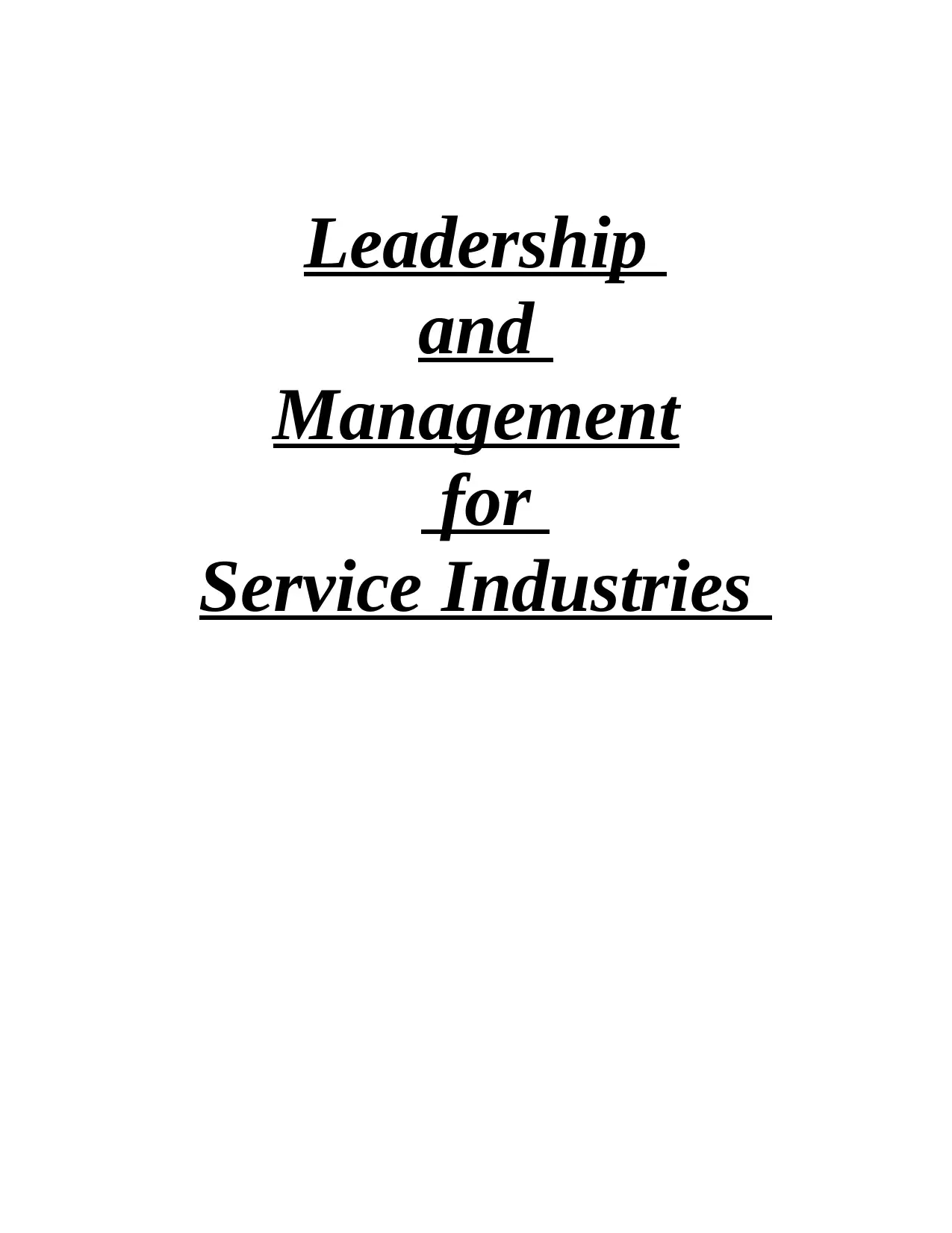
Leadership
and
Management
for
Service Industries
and
Management
for
Service Industries
Paraphrase This Document
Need a fresh take? Get an instant paraphrase of this document with our AI Paraphraser
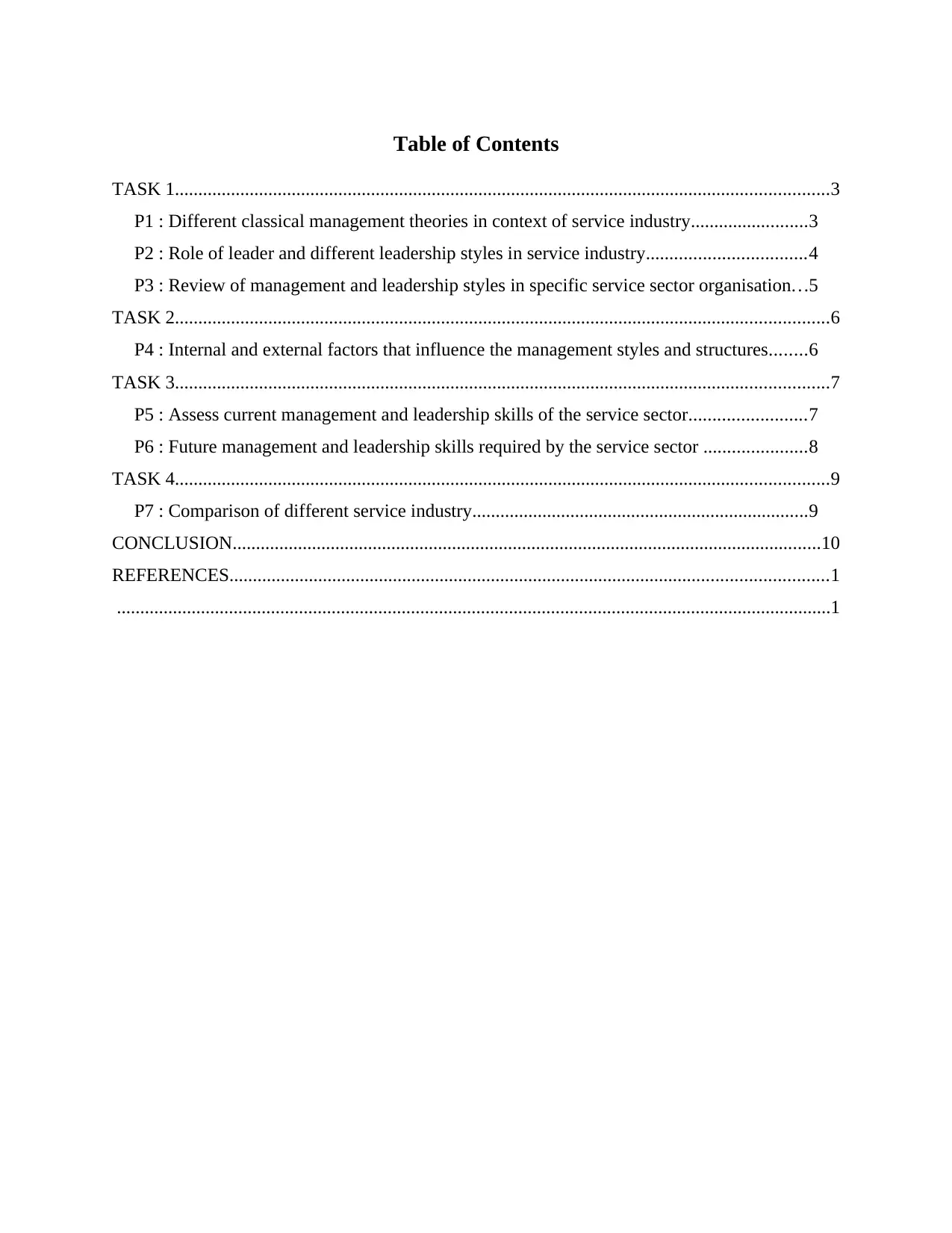
Table of Contents
TASK 1............................................................................................................................................3
P1 : Different classical management theories in context of service industry.........................3
P2 : Role of leader and different leadership styles in service industry..................................4
P3 : Review of management and leadership styles in specific service sector organisation...5
TASK 2............................................................................................................................................6
P4 : Internal and external factors that influence the management styles and structures........6
TASK 3............................................................................................................................................7
P5 : Assess current management and leadership skills of the service sector.........................7
P6 : Future management and leadership skills required by the service sector ......................8
TASK 4............................................................................................................................................9
P7 : Comparison of different service industry........................................................................9
CONCLUSION..............................................................................................................................10
REFERENCES................................................................................................................................1
.........................................................................................................................................................1
TASK 1............................................................................................................................................3
P1 : Different classical management theories in context of service industry.........................3
P2 : Role of leader and different leadership styles in service industry..................................4
P3 : Review of management and leadership styles in specific service sector organisation...5
TASK 2............................................................................................................................................6
P4 : Internal and external factors that influence the management styles and structures........6
TASK 3............................................................................................................................................7
P5 : Assess current management and leadership skills of the service sector.........................7
P6 : Future management and leadership skills required by the service sector ......................8
TASK 4............................................................................................................................................9
P7 : Comparison of different service industry........................................................................9
CONCLUSION..............................................................................................................................10
REFERENCES................................................................................................................................1
.........................................................................................................................................................1
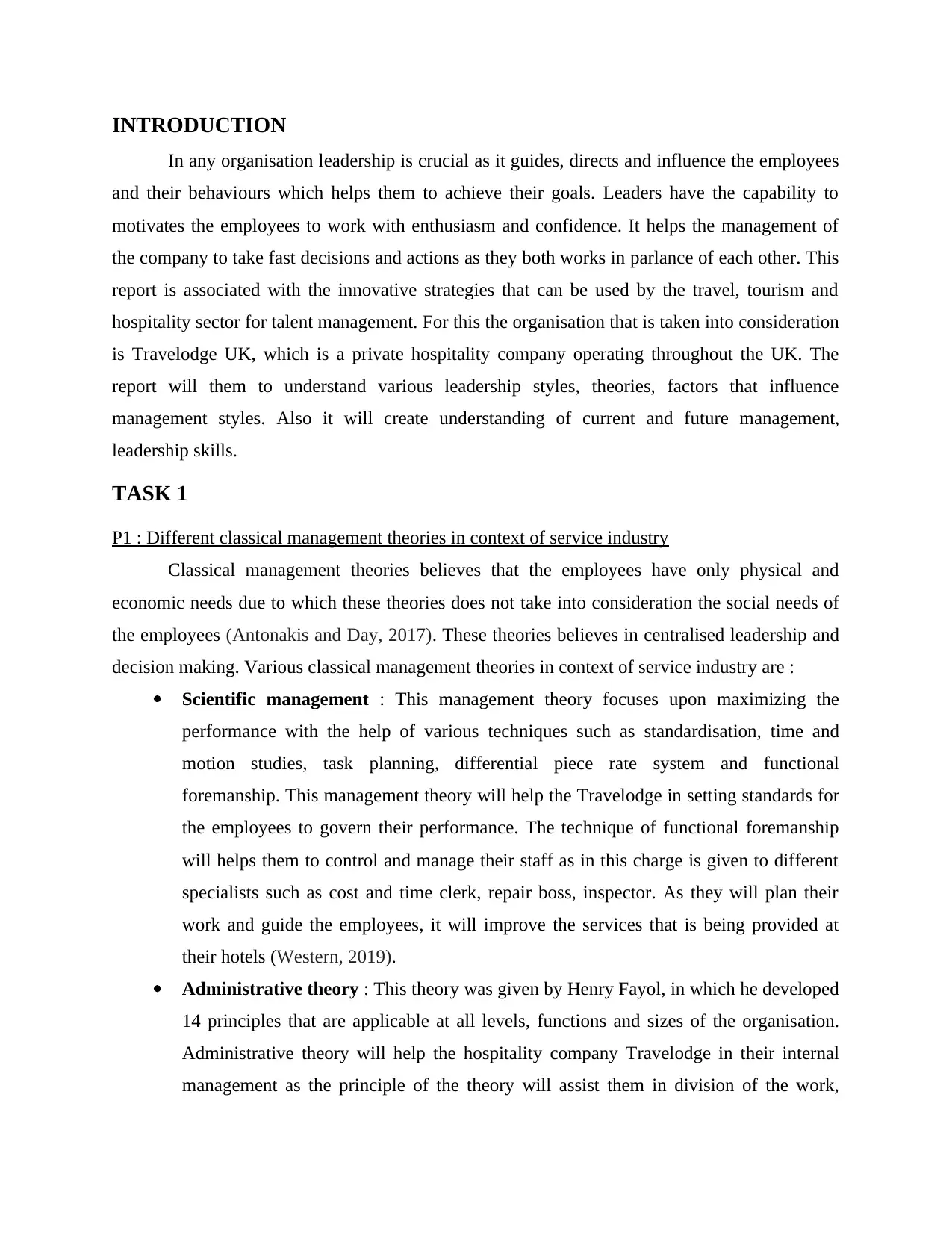
INTRODUCTION
In any organisation leadership is crucial as it guides, directs and influence the employees
and their behaviours which helps them to achieve their goals. Leaders have the capability to
motivates the employees to work with enthusiasm and confidence. It helps the management of
the company to take fast decisions and actions as they both works in parlance of each other. This
report is associated with the innovative strategies that can be used by the travel, tourism and
hospitality sector for talent management. For this the organisation that is taken into consideration
is Travelodge UK, which is a private hospitality company operating throughout the UK. The
report will them to understand various leadership styles, theories, factors that influence
management styles. Also it will create understanding of current and future management,
leadership skills.
TASK 1
P1 : Different classical management theories in context of service industry
Classical management theories believes that the employees have only physical and
economic needs due to which these theories does not take into consideration the social needs of
the employees (Antonakis and Day, 2017). These theories believes in centralised leadership and
decision making. Various classical management theories in context of service industry are :
Scientific management : This management theory focuses upon maximizing the
performance with the help of various techniques such as standardisation, time and
motion studies, task planning, differential piece rate system and functional
foremanship. This management theory will help the Travelodge in setting standards for
the employees to govern their performance. The technique of functional foremanship
will helps them to control and manage their staff as in this charge is given to different
specialists such as cost and time clerk, repair boss, inspector. As they will plan their
work and guide the employees, it will improve the services that is being provided at
their hotels (Western, 2019).
Administrative theory : This theory was given by Henry Fayol, in which he developed
14 principles that are applicable at all levels, functions and sizes of the organisation.
Administrative theory will help the hospitality company Travelodge in their internal
management as the principle of the theory will assist them in division of the work,
In any organisation leadership is crucial as it guides, directs and influence the employees
and their behaviours which helps them to achieve their goals. Leaders have the capability to
motivates the employees to work with enthusiasm and confidence. It helps the management of
the company to take fast decisions and actions as they both works in parlance of each other. This
report is associated with the innovative strategies that can be used by the travel, tourism and
hospitality sector for talent management. For this the organisation that is taken into consideration
is Travelodge UK, which is a private hospitality company operating throughout the UK. The
report will them to understand various leadership styles, theories, factors that influence
management styles. Also it will create understanding of current and future management,
leadership skills.
TASK 1
P1 : Different classical management theories in context of service industry
Classical management theories believes that the employees have only physical and
economic needs due to which these theories does not take into consideration the social needs of
the employees (Antonakis and Day, 2017). These theories believes in centralised leadership and
decision making. Various classical management theories in context of service industry are :
Scientific management : This management theory focuses upon maximizing the
performance with the help of various techniques such as standardisation, time and
motion studies, task planning, differential piece rate system and functional
foremanship. This management theory will help the Travelodge in setting standards for
the employees to govern their performance. The technique of functional foremanship
will helps them to control and manage their staff as in this charge is given to different
specialists such as cost and time clerk, repair boss, inspector. As they will plan their
work and guide the employees, it will improve the services that is being provided at
their hotels (Western, 2019).
Administrative theory : This theory was given by Henry Fayol, in which he developed
14 principles that are applicable at all levels, functions and sizes of the organisation.
Administrative theory will help the hospitality company Travelodge in their internal
management as the principle of the theory will assist them in division of the work,
⊘ This is a preview!⊘
Do you want full access?
Subscribe today to unlock all pages.

Trusted by 1+ million students worldwide
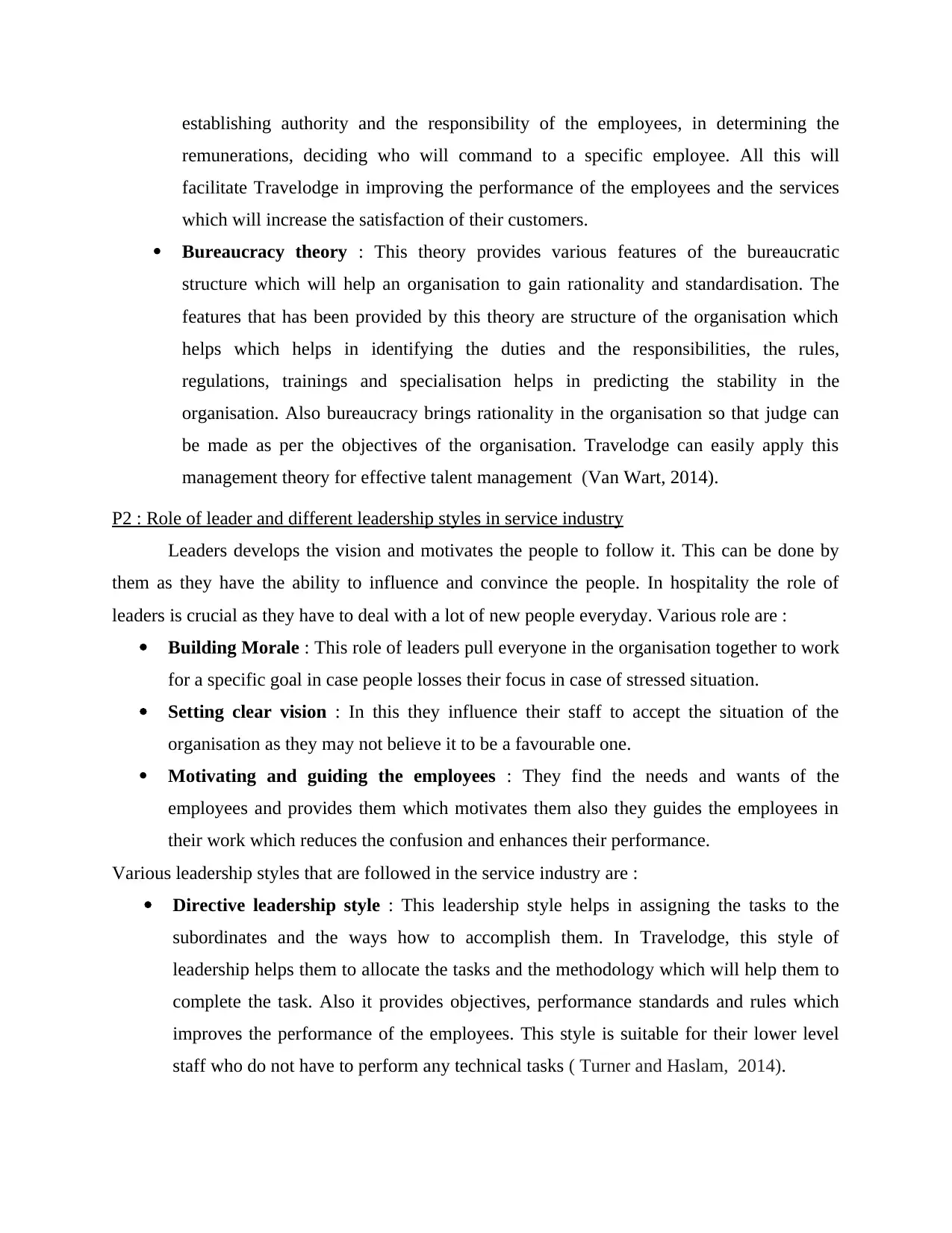
establishing authority and the responsibility of the employees, in determining the
remunerations, deciding who will command to a specific employee. All this will
facilitate Travelodge in improving the performance of the employees and the services
which will increase the satisfaction of their customers.
Bureaucracy theory : This theory provides various features of the bureaucratic
structure which will help an organisation to gain rationality and standardisation. The
features that has been provided by this theory are structure of the organisation which
helps which helps in identifying the duties and the responsibilities, the rules,
regulations, trainings and specialisation helps in predicting the stability in the
organisation. Also bureaucracy brings rationality in the organisation so that judge can
be made as per the objectives of the organisation. Travelodge can easily apply this
management theory for effective talent management (Van Wart, 2014).
P2 : Role of leader and different leadership styles in service industry
Leaders develops the vision and motivates the people to follow it. This can be done by
them as they have the ability to influence and convince the people. In hospitality the role of
leaders is crucial as they have to deal with a lot of new people everyday. Various role are :
Building Morale : This role of leaders pull everyone in the organisation together to work
for a specific goal in case people losses their focus in case of stressed situation.
Setting clear vision : In this they influence their staff to accept the situation of the
organisation as they may not believe it to be a favourable one.
Motivating and guiding the employees : They find the needs and wants of the
employees and provides them which motivates them also they guides the employees in
their work which reduces the confusion and enhances their performance.
Various leadership styles that are followed in the service industry are :
Directive leadership style : This leadership style helps in assigning the tasks to the
subordinates and the ways how to accomplish them. In Travelodge, this style of
leadership helps them to allocate the tasks and the methodology which will help them to
complete the task. Also it provides objectives, performance standards and rules which
improves the performance of the employees. This style is suitable for their lower level
staff who do not have to perform any technical tasks ( Turner and Haslam, 2014).
remunerations, deciding who will command to a specific employee. All this will
facilitate Travelodge in improving the performance of the employees and the services
which will increase the satisfaction of their customers.
Bureaucracy theory : This theory provides various features of the bureaucratic
structure which will help an organisation to gain rationality and standardisation. The
features that has been provided by this theory are structure of the organisation which
helps which helps in identifying the duties and the responsibilities, the rules,
regulations, trainings and specialisation helps in predicting the stability in the
organisation. Also bureaucracy brings rationality in the organisation so that judge can
be made as per the objectives of the organisation. Travelodge can easily apply this
management theory for effective talent management (Van Wart, 2014).
P2 : Role of leader and different leadership styles in service industry
Leaders develops the vision and motivates the people to follow it. This can be done by
them as they have the ability to influence and convince the people. In hospitality the role of
leaders is crucial as they have to deal with a lot of new people everyday. Various role are :
Building Morale : This role of leaders pull everyone in the organisation together to work
for a specific goal in case people losses their focus in case of stressed situation.
Setting clear vision : In this they influence their staff to accept the situation of the
organisation as they may not believe it to be a favourable one.
Motivating and guiding the employees : They find the needs and wants of the
employees and provides them which motivates them also they guides the employees in
their work which reduces the confusion and enhances their performance.
Various leadership styles that are followed in the service industry are :
Directive leadership style : This leadership style helps in assigning the tasks to the
subordinates and the ways how to accomplish them. In Travelodge, this style of
leadership helps them to allocate the tasks and the methodology which will help them to
complete the task. Also it provides objectives, performance standards and rules which
improves the performance of the employees. This style is suitable for their lower level
staff who do not have to perform any technical tasks ( Turner and Haslam, 2014).
Paraphrase This Document
Need a fresh take? Get an instant paraphrase of this document with our AI Paraphraser
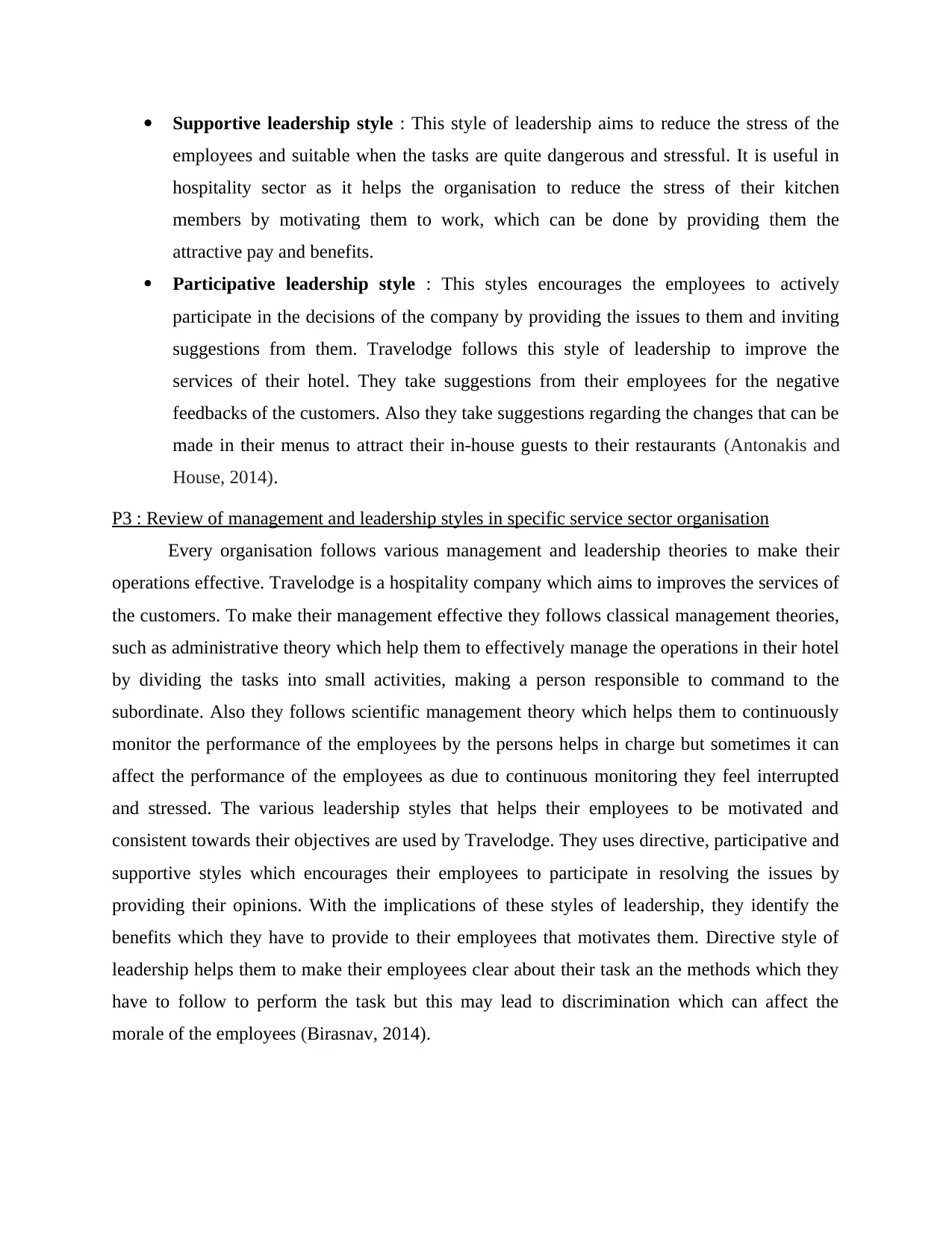
Supportive leadership style : This style of leadership aims to reduce the stress of the
employees and suitable when the tasks are quite dangerous and stressful. It is useful in
hospitality sector as it helps the organisation to reduce the stress of their kitchen
members by motivating them to work, which can be done by providing them the
attractive pay and benefits.
Participative leadership style : This styles encourages the employees to actively
participate in the decisions of the company by providing the issues to them and inviting
suggestions from them. Travelodge follows this style of leadership to improve the
services of their hotel. They take suggestions from their employees for the negative
feedbacks of the customers. Also they take suggestions regarding the changes that can be
made in their menus to attract their in-house guests to their restaurants (Antonakis and
House, 2014).
P3 : Review of management and leadership styles in specific service sector organisation
Every organisation follows various management and leadership theories to make their
operations effective. Travelodge is a hospitality company which aims to improves the services of
the customers. To make their management effective they follows classical management theories,
such as administrative theory which help them to effectively manage the operations in their hotel
by dividing the tasks into small activities, making a person responsible to command to the
subordinate. Also they follows scientific management theory which helps them to continuously
monitor the performance of the employees by the persons helps in charge but sometimes it can
affect the performance of the employees as due to continuous monitoring they feel interrupted
and stressed. The various leadership styles that helps their employees to be motivated and
consistent towards their objectives are used by Travelodge. They uses directive, participative and
supportive styles which encourages their employees to participate in resolving the issues by
providing their opinions. With the implications of these styles of leadership, they identify the
benefits which they have to provide to their employees that motivates them. Directive style of
leadership helps them to make their employees clear about their task an the methods which they
have to follow to perform the task but this may lead to discrimination which can affect the
morale of the employees (Birasnav, 2014).
employees and suitable when the tasks are quite dangerous and stressful. It is useful in
hospitality sector as it helps the organisation to reduce the stress of their kitchen
members by motivating them to work, which can be done by providing them the
attractive pay and benefits.
Participative leadership style : This styles encourages the employees to actively
participate in the decisions of the company by providing the issues to them and inviting
suggestions from them. Travelodge follows this style of leadership to improve the
services of their hotel. They take suggestions from their employees for the negative
feedbacks of the customers. Also they take suggestions regarding the changes that can be
made in their menus to attract their in-house guests to their restaurants (Antonakis and
House, 2014).
P3 : Review of management and leadership styles in specific service sector organisation
Every organisation follows various management and leadership theories to make their
operations effective. Travelodge is a hospitality company which aims to improves the services of
the customers. To make their management effective they follows classical management theories,
such as administrative theory which help them to effectively manage the operations in their hotel
by dividing the tasks into small activities, making a person responsible to command to the
subordinate. Also they follows scientific management theory which helps them to continuously
monitor the performance of the employees by the persons helps in charge but sometimes it can
affect the performance of the employees as due to continuous monitoring they feel interrupted
and stressed. The various leadership styles that helps their employees to be motivated and
consistent towards their objectives are used by Travelodge. They uses directive, participative and
supportive styles which encourages their employees to participate in resolving the issues by
providing their opinions. With the implications of these styles of leadership, they identify the
benefits which they have to provide to their employees that motivates them. Directive style of
leadership helps them to make their employees clear about their task an the methods which they
have to follow to perform the task but this may lead to discrimination which can affect the
morale of the employees (Birasnav, 2014).
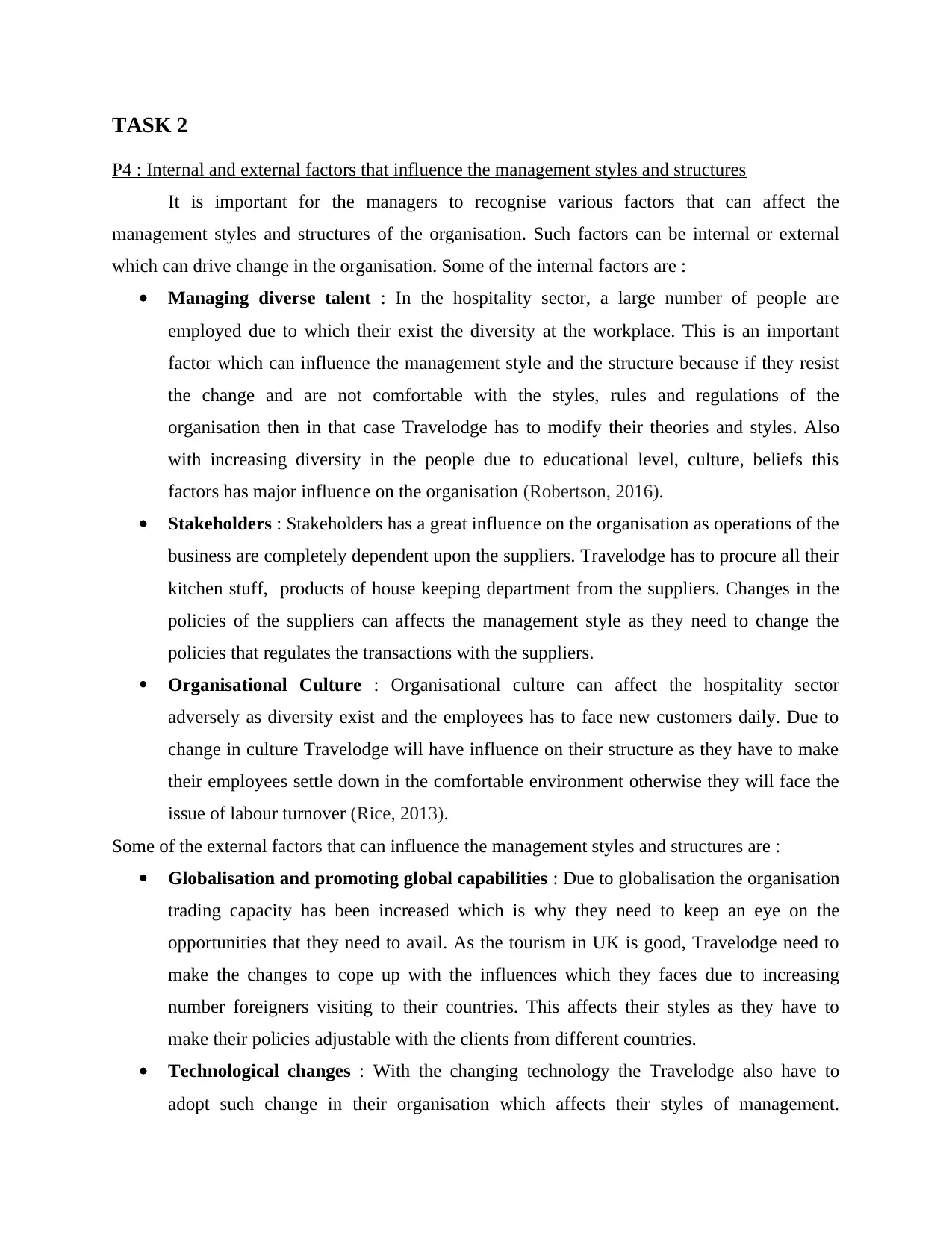
TASK 2
P4 : Internal and external factors that influence the management styles and structures
It is important for the managers to recognise various factors that can affect the
management styles and structures of the organisation. Such factors can be internal or external
which can drive change in the organisation. Some of the internal factors are :
Managing diverse talent : In the hospitality sector, a large number of people are
employed due to which their exist the diversity at the workplace. This is an important
factor which can influence the management style and the structure because if they resist
the change and are not comfortable with the styles, rules and regulations of the
organisation then in that case Travelodge has to modify their theories and styles. Also
with increasing diversity in the people due to educational level, culture, beliefs this
factors has major influence on the organisation (Robertson, 2016).
Stakeholders : Stakeholders has a great influence on the organisation as operations of the
business are completely dependent upon the suppliers. Travelodge has to procure all their
kitchen stuff, products of house keeping department from the suppliers. Changes in the
policies of the suppliers can affects the management style as they need to change the
policies that regulates the transactions with the suppliers.
Organisational Culture : Organisational culture can affect the hospitality sector
adversely as diversity exist and the employees has to face new customers daily. Due to
change in culture Travelodge will have influence on their structure as they have to make
their employees settle down in the comfortable environment otherwise they will face the
issue of labour turnover (Rice, 2013).
Some of the external factors that can influence the management styles and structures are :
Globalisation and promoting global capabilities : Due to globalisation the organisation
trading capacity has been increased which is why they need to keep an eye on the
opportunities that they need to avail. As the tourism in UK is good, Travelodge need to
make the changes to cope up with the influences which they faces due to increasing
number foreigners visiting to their countries. This affects their styles as they have to
make their policies adjustable with the clients from different countries.
Technological changes : With the changing technology the Travelodge also have to
adopt such change in their organisation which affects their styles of management.
P4 : Internal and external factors that influence the management styles and structures
It is important for the managers to recognise various factors that can affect the
management styles and structures of the organisation. Such factors can be internal or external
which can drive change in the organisation. Some of the internal factors are :
Managing diverse talent : In the hospitality sector, a large number of people are
employed due to which their exist the diversity at the workplace. This is an important
factor which can influence the management style and the structure because if they resist
the change and are not comfortable with the styles, rules and regulations of the
organisation then in that case Travelodge has to modify their theories and styles. Also
with increasing diversity in the people due to educational level, culture, beliefs this
factors has major influence on the organisation (Robertson, 2016).
Stakeholders : Stakeholders has a great influence on the organisation as operations of the
business are completely dependent upon the suppliers. Travelodge has to procure all their
kitchen stuff, products of house keeping department from the suppliers. Changes in the
policies of the suppliers can affects the management style as they need to change the
policies that regulates the transactions with the suppliers.
Organisational Culture : Organisational culture can affect the hospitality sector
adversely as diversity exist and the employees has to face new customers daily. Due to
change in culture Travelodge will have influence on their structure as they have to make
their employees settle down in the comfortable environment otherwise they will face the
issue of labour turnover (Rice, 2013).
Some of the external factors that can influence the management styles and structures are :
Globalisation and promoting global capabilities : Due to globalisation the organisation
trading capacity has been increased which is why they need to keep an eye on the
opportunities that they need to avail. As the tourism in UK is good, Travelodge need to
make the changes to cope up with the influences which they faces due to increasing
number foreigners visiting to their countries. This affects their styles as they have to
make their policies adjustable with the clients from different countries.
Technological changes : With the changing technology the Travelodge also have to
adopt such change in their organisation which affects their styles of management.
⊘ This is a preview!⊘
Do you want full access?
Subscribe today to unlock all pages.

Trusted by 1+ million students worldwide
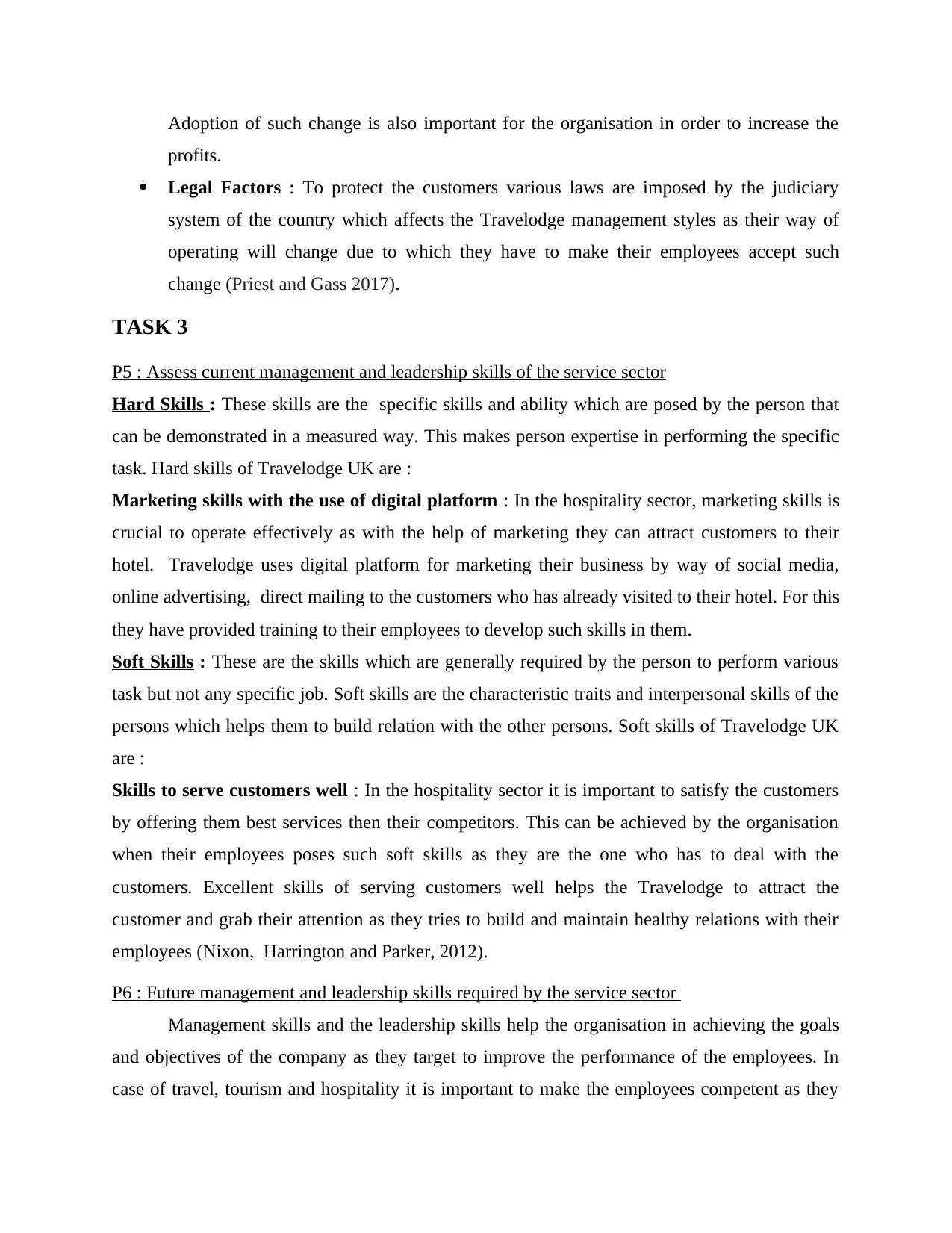
Adoption of such change is also important for the organisation in order to increase the
profits.
Legal Factors : To protect the customers various laws are imposed by the judiciary
system of the country which affects the Travelodge management styles as their way of
operating will change due to which they have to make their employees accept such
change (Priest and Gass 2017).
TASK 3
P5 : Assess current management and leadership skills of the service sector
Hard Skills : These skills are the specific skills and ability which are posed by the person that
can be demonstrated in a measured way. This makes person expertise in performing the specific
task. Hard skills of Travelodge UK are :
Marketing skills with the use of digital platform : In the hospitality sector, marketing skills is
crucial to operate effectively as with the help of marketing they can attract customers to their
hotel. Travelodge uses digital platform for marketing their business by way of social media,
online advertising, direct mailing to the customers who has already visited to their hotel. For this
they have provided training to their employees to develop such skills in them.
Soft Skills : These are the skills which are generally required by the person to perform various
task but not any specific job. Soft skills are the characteristic traits and interpersonal skills of the
persons which helps them to build relation with the other persons. Soft skills of Travelodge UK
are :
Skills to serve customers well : In the hospitality sector it is important to satisfy the customers
by offering them best services then their competitors. This can be achieved by the organisation
when their employees poses such soft skills as they are the one who has to deal with the
customers. Excellent skills of serving customers well helps the Travelodge to attract the
customer and grab their attention as they tries to build and maintain healthy relations with their
employees (Nixon, Harrington and Parker, 2012).
P6 : Future management and leadership skills required by the service sector
Management skills and the leadership skills help the organisation in achieving the goals
and objectives of the company as they target to improve the performance of the employees. In
case of travel, tourism and hospitality it is important to make the employees competent as they
profits.
Legal Factors : To protect the customers various laws are imposed by the judiciary
system of the country which affects the Travelodge management styles as their way of
operating will change due to which they have to make their employees accept such
change (Priest and Gass 2017).
TASK 3
P5 : Assess current management and leadership skills of the service sector
Hard Skills : These skills are the specific skills and ability which are posed by the person that
can be demonstrated in a measured way. This makes person expertise in performing the specific
task. Hard skills of Travelodge UK are :
Marketing skills with the use of digital platform : In the hospitality sector, marketing skills is
crucial to operate effectively as with the help of marketing they can attract customers to their
hotel. Travelodge uses digital platform for marketing their business by way of social media,
online advertising, direct mailing to the customers who has already visited to their hotel. For this
they have provided training to their employees to develop such skills in them.
Soft Skills : These are the skills which are generally required by the person to perform various
task but not any specific job. Soft skills are the characteristic traits and interpersonal skills of the
persons which helps them to build relation with the other persons. Soft skills of Travelodge UK
are :
Skills to serve customers well : In the hospitality sector it is important to satisfy the customers
by offering them best services then their competitors. This can be achieved by the organisation
when their employees poses such soft skills as they are the one who has to deal with the
customers. Excellent skills of serving customers well helps the Travelodge to attract the
customer and grab their attention as they tries to build and maintain healthy relations with their
employees (Nixon, Harrington and Parker, 2012).
P6 : Future management and leadership skills required by the service sector
Management skills and the leadership skills help the organisation in achieving the goals
and objectives of the company as they target to improve the performance of the employees. In
case of travel, tourism and hospitality it is important to make the employees competent as they
Paraphrase This Document
Need a fresh take? Get an instant paraphrase of this document with our AI Paraphraser
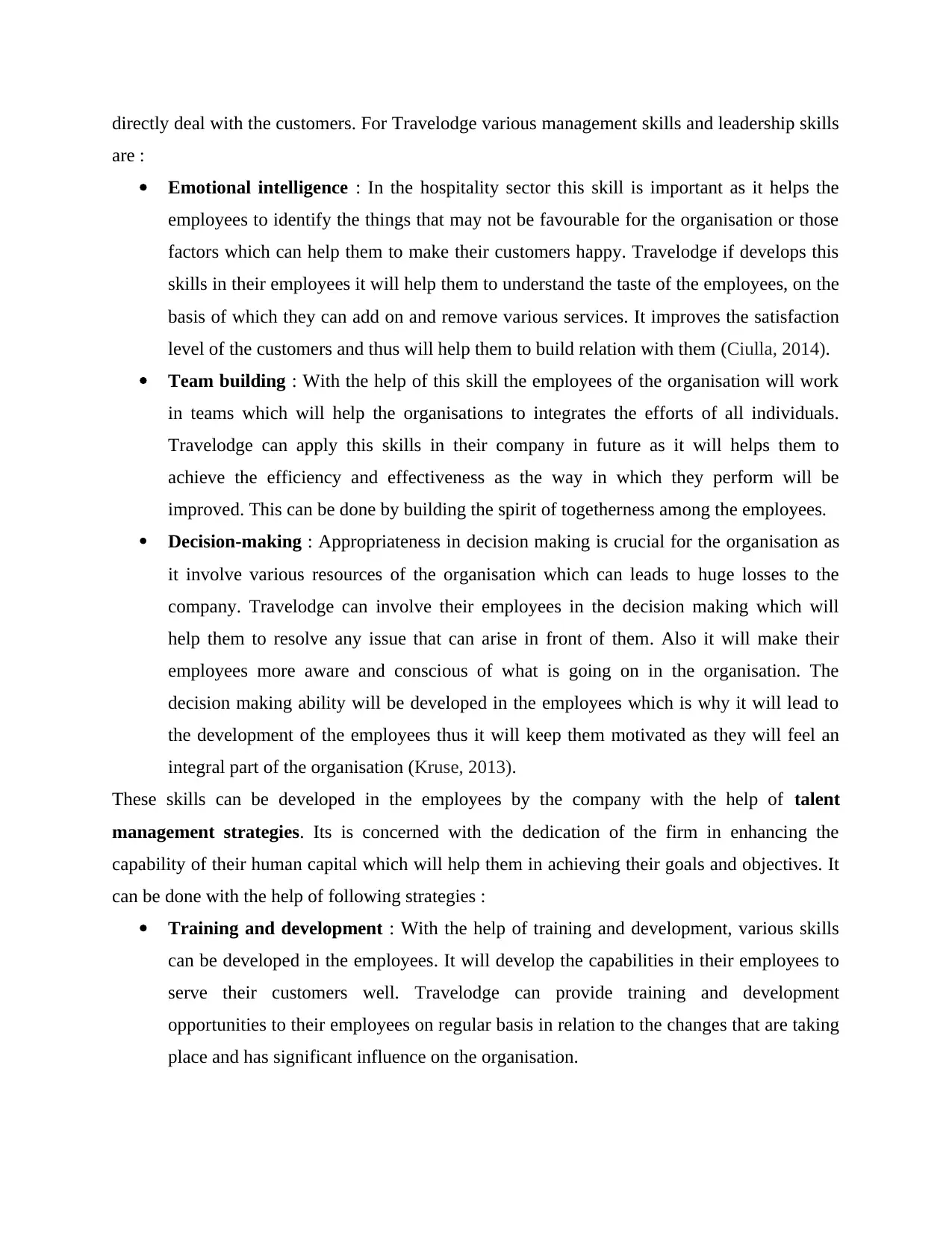
directly deal with the customers. For Travelodge various management skills and leadership skills
are :
Emotional intelligence : In the hospitality sector this skill is important as it helps the
employees to identify the things that may not be favourable for the organisation or those
factors which can help them to make their customers happy. Travelodge if develops this
skills in their employees it will help them to understand the taste of the employees, on the
basis of which they can add on and remove various services. It improves the satisfaction
level of the customers and thus will help them to build relation with them (Ciulla, 2014).
Team building : With the help of this skill the employees of the organisation will work
in teams which will help the organisations to integrates the efforts of all individuals.
Travelodge can apply this skills in their company in future as it will helps them to
achieve the efficiency and effectiveness as the way in which they perform will be
improved. This can be done by building the spirit of togetherness among the employees.
Decision-making : Appropriateness in decision making is crucial for the organisation as
it involve various resources of the organisation which can leads to huge losses to the
company. Travelodge can involve their employees in the decision making which will
help them to resolve any issue that can arise in front of them. Also it will make their
employees more aware and conscious of what is going on in the organisation. The
decision making ability will be developed in the employees which is why it will lead to
the development of the employees thus it will keep them motivated as they will feel an
integral part of the organisation (Kruse, 2013).
These skills can be developed in the employees by the company with the help of talent
management strategies. Its is concerned with the dedication of the firm in enhancing the
capability of their human capital which will help them in achieving their goals and objectives. It
can be done with the help of following strategies :
Training and development : With the help of training and development, various skills
can be developed in the employees. It will develop the capabilities in their employees to
serve their customers well. Travelodge can provide training and development
opportunities to their employees on regular basis in relation to the changes that are taking
place and has significant influence on the organisation.
are :
Emotional intelligence : In the hospitality sector this skill is important as it helps the
employees to identify the things that may not be favourable for the organisation or those
factors which can help them to make their customers happy. Travelodge if develops this
skills in their employees it will help them to understand the taste of the employees, on the
basis of which they can add on and remove various services. It improves the satisfaction
level of the customers and thus will help them to build relation with them (Ciulla, 2014).
Team building : With the help of this skill the employees of the organisation will work
in teams which will help the organisations to integrates the efforts of all individuals.
Travelodge can apply this skills in their company in future as it will helps them to
achieve the efficiency and effectiveness as the way in which they perform will be
improved. This can be done by building the spirit of togetherness among the employees.
Decision-making : Appropriateness in decision making is crucial for the organisation as
it involve various resources of the organisation which can leads to huge losses to the
company. Travelodge can involve their employees in the decision making which will
help them to resolve any issue that can arise in front of them. Also it will make their
employees more aware and conscious of what is going on in the organisation. The
decision making ability will be developed in the employees which is why it will lead to
the development of the employees thus it will keep them motivated as they will feel an
integral part of the organisation (Kruse, 2013).
These skills can be developed in the employees by the company with the help of talent
management strategies. Its is concerned with the dedication of the firm in enhancing the
capability of their human capital which will help them in achieving their goals and objectives. It
can be done with the help of following strategies :
Training and development : With the help of training and development, various skills
can be developed in the employees. It will develop the capabilities in their employees to
serve their customers well. Travelodge can provide training and development
opportunities to their employees on regular basis in relation to the changes that are taking
place and has significant influence on the organisation.
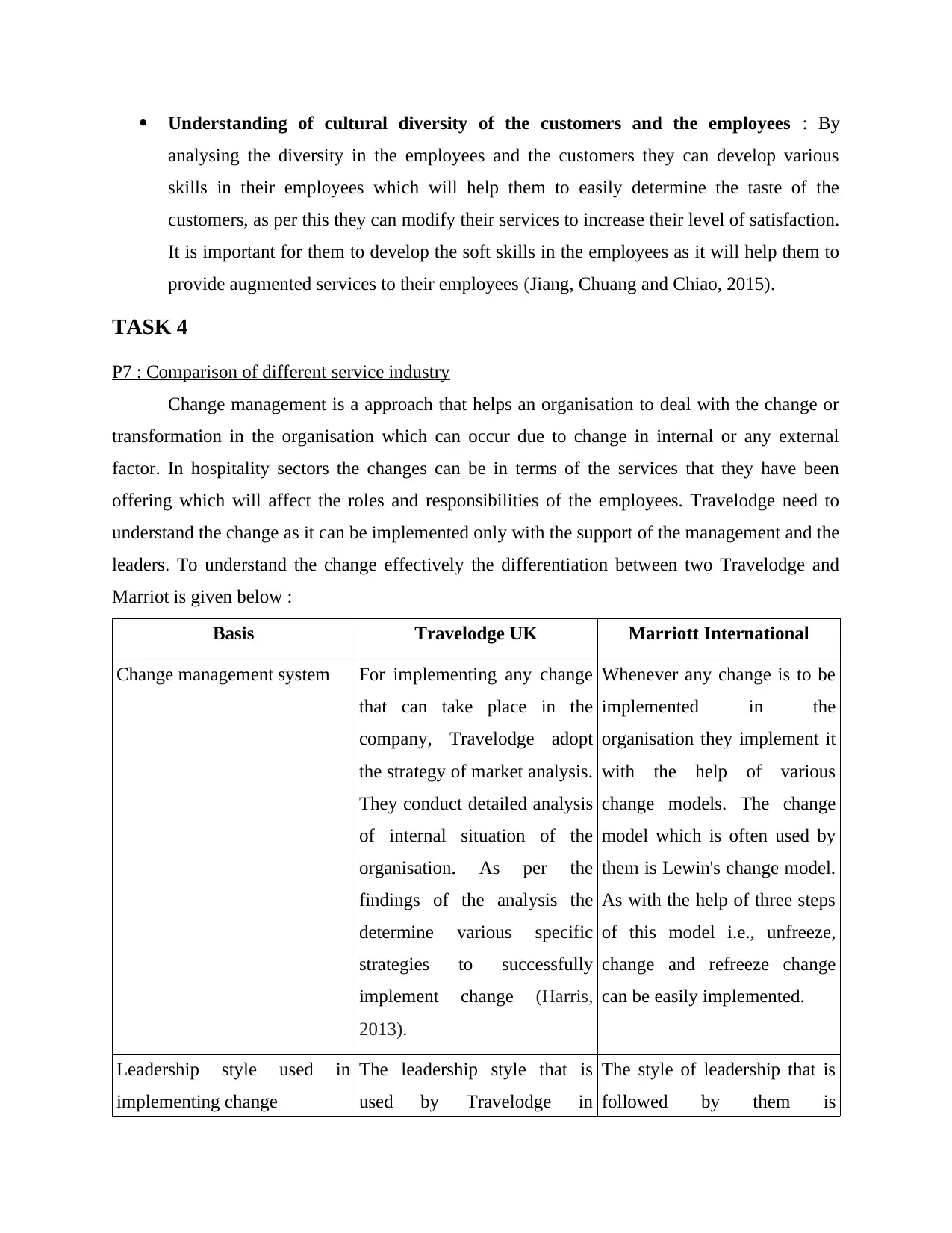
Understanding of cultural diversity of the customers and the employees : By
analysing the diversity in the employees and the customers they can develop various
skills in their employees which will help them to easily determine the taste of the
customers, as per this they can modify their services to increase their level of satisfaction.
It is important for them to develop the soft skills in the employees as it will help them to
provide augmented services to their employees (Jiang, Chuang and Chiao, 2015).
TASK 4
P7 : Comparison of different service industry
Change management is a approach that helps an organisation to deal with the change or
transformation in the organisation which can occur due to change in internal or any external
factor. In hospitality sectors the changes can be in terms of the services that they have been
offering which will affect the roles and responsibilities of the employees. Travelodge need to
understand the change as it can be implemented only with the support of the management and the
leaders. To understand the change effectively the differentiation between two Travelodge and
Marriot is given below :
Basis Travelodge UK Marriott International
Change management system For implementing any change
that can take place in the
company, Travelodge adopt
the strategy of market analysis.
They conduct detailed analysis
of internal situation of the
organisation. As per the
findings of the analysis the
determine various specific
strategies to successfully
implement change (Harris,
2013).
Whenever any change is to be
implemented in the
organisation they implement it
with the help of various
change models. The change
model which is often used by
them is Lewin's change model.
As with the help of three steps
of this model i.e., unfreeze,
change and refreeze change
can be easily implemented.
Leadership style used in
implementing change
The leadership style that is
used by Travelodge in
The style of leadership that is
followed by them is
analysing the diversity in the employees and the customers they can develop various
skills in their employees which will help them to easily determine the taste of the
customers, as per this they can modify their services to increase their level of satisfaction.
It is important for them to develop the soft skills in the employees as it will help them to
provide augmented services to their employees (Jiang, Chuang and Chiao, 2015).
TASK 4
P7 : Comparison of different service industry
Change management is a approach that helps an organisation to deal with the change or
transformation in the organisation which can occur due to change in internal or any external
factor. In hospitality sectors the changes can be in terms of the services that they have been
offering which will affect the roles and responsibilities of the employees. Travelodge need to
understand the change as it can be implemented only with the support of the management and the
leaders. To understand the change effectively the differentiation between two Travelodge and
Marriot is given below :
Basis Travelodge UK Marriott International
Change management system For implementing any change
that can take place in the
company, Travelodge adopt
the strategy of market analysis.
They conduct detailed analysis
of internal situation of the
organisation. As per the
findings of the analysis the
determine various specific
strategies to successfully
implement change (Harris,
2013).
Whenever any change is to be
implemented in the
organisation they implement it
with the help of various
change models. The change
model which is often used by
them is Lewin's change model.
As with the help of three steps
of this model i.e., unfreeze,
change and refreeze change
can be easily implemented.
Leadership style used in
implementing change
The leadership style that is
used by Travelodge in
The style of leadership that is
followed by them is
⊘ This is a preview!⊘
Do you want full access?
Subscribe today to unlock all pages.

Trusted by 1+ million students worldwide
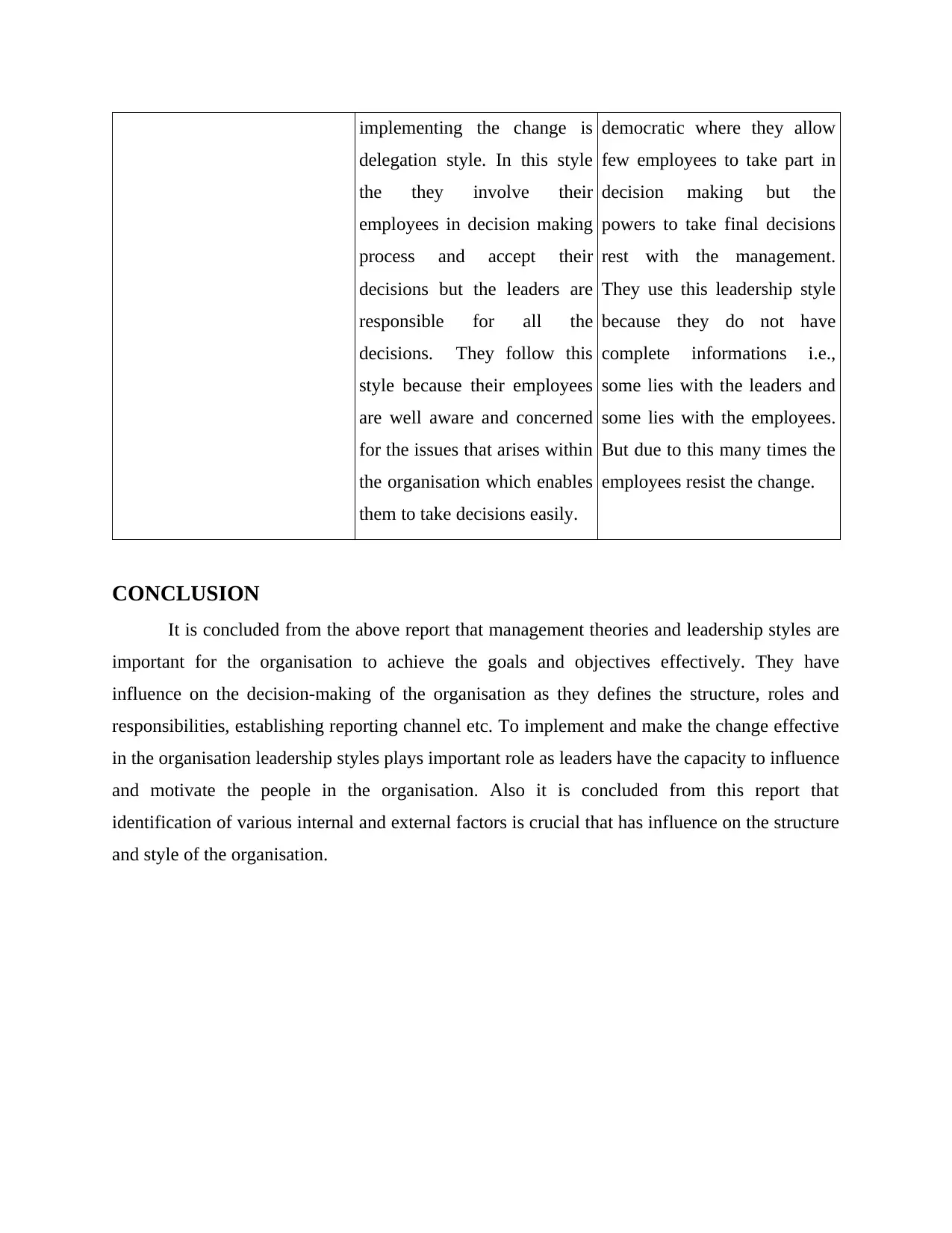
implementing the change is
delegation style. In this style
the they involve their
employees in decision making
process and accept their
decisions but the leaders are
responsible for all the
decisions. They follow this
style because their employees
are well aware and concerned
for the issues that arises within
the organisation which enables
them to take decisions easily.
democratic where they allow
few employees to take part in
decision making but the
powers to take final decisions
rest with the management.
They use this leadership style
because they do not have
complete informations i.e.,
some lies with the leaders and
some lies with the employees.
But due to this many times the
employees resist the change.
CONCLUSION
It is concluded from the above report that management theories and leadership styles are
important for the organisation to achieve the goals and objectives effectively. They have
influence on the decision-making of the organisation as they defines the structure, roles and
responsibilities, establishing reporting channel etc. To implement and make the change effective
in the organisation leadership styles plays important role as leaders have the capacity to influence
and motivate the people in the organisation. Also it is concluded from this report that
identification of various internal and external factors is crucial that has influence on the structure
and style of the organisation.
delegation style. In this style
the they involve their
employees in decision making
process and accept their
decisions but the leaders are
responsible for all the
decisions. They follow this
style because their employees
are well aware and concerned
for the issues that arises within
the organisation which enables
them to take decisions easily.
democratic where they allow
few employees to take part in
decision making but the
powers to take final decisions
rest with the management.
They use this leadership style
because they do not have
complete informations i.e.,
some lies with the leaders and
some lies with the employees.
But due to this many times the
employees resist the change.
CONCLUSION
It is concluded from the above report that management theories and leadership styles are
important for the organisation to achieve the goals and objectives effectively. They have
influence on the decision-making of the organisation as they defines the structure, roles and
responsibilities, establishing reporting channel etc. To implement and make the change effective
in the organisation leadership styles plays important role as leaders have the capacity to influence
and motivate the people in the organisation. Also it is concluded from this report that
identification of various internal and external factors is crucial that has influence on the structure
and style of the organisation.
Paraphrase This Document
Need a fresh take? Get an instant paraphrase of this document with our AI Paraphraser
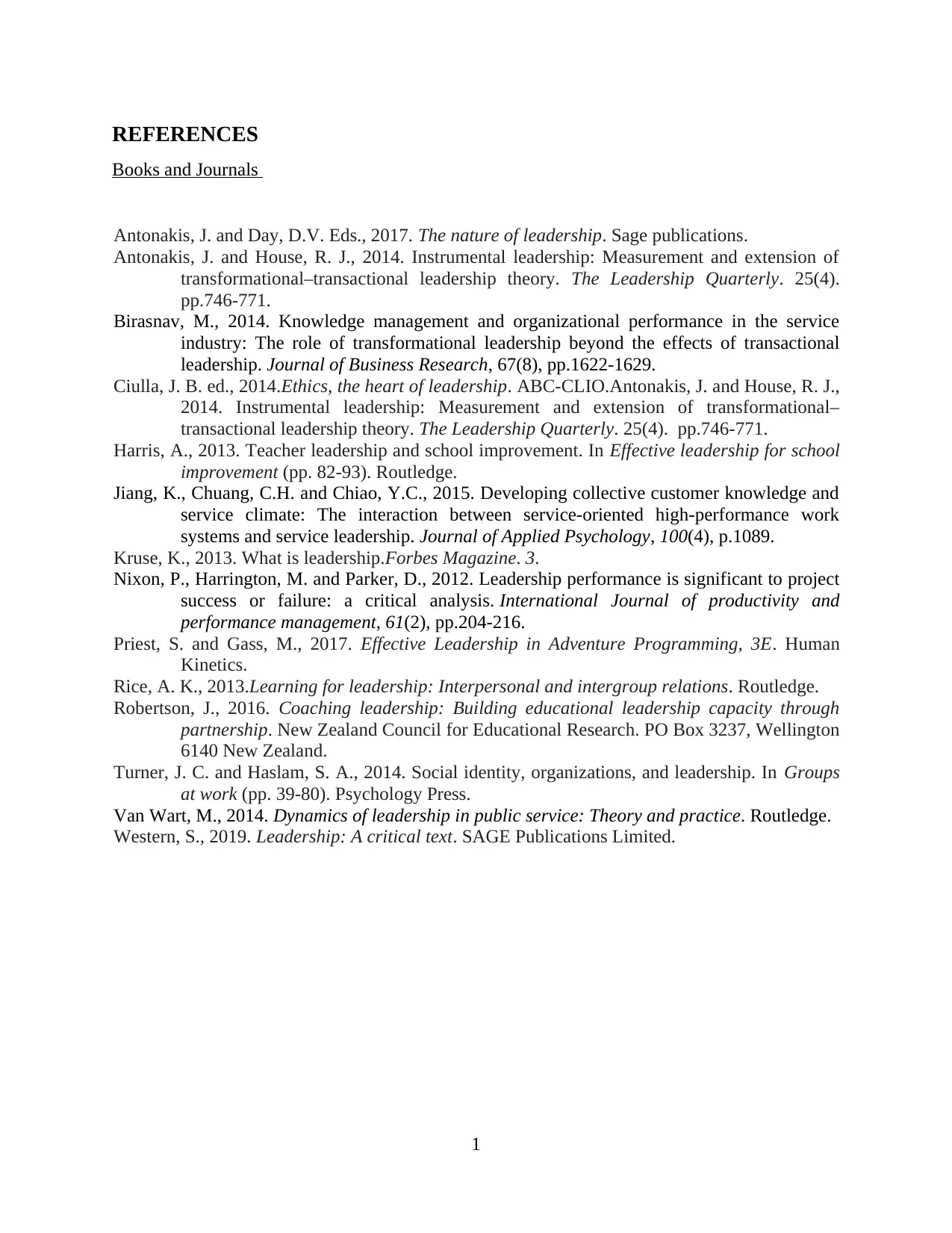
REFERENCES
Books and Journals
Antonakis, J. and Day, D.V. Eds., 2017. The nature of leadership. Sage publications.
Antonakis, J. and House, R. J., 2014. Instrumental leadership: Measurement and extension of
transformational–transactional leadership theory. The Leadership Quarterly. 25(4).
pp.746-771.
Birasnav, M., 2014. Knowledge management and organizational performance in the service
industry: The role of transformational leadership beyond the effects of transactional
leadership. Journal of Business Research, 67(8), pp.1622-1629.
Ciulla, J. B. ed., 2014.Ethics, the heart of leadership. ABC-CLIO.Antonakis, J. and House, R. J.,
2014. Instrumental leadership: Measurement and extension of transformational–
transactional leadership theory. The Leadership Quarterly. 25(4). pp.746-771.
Harris, A., 2013. Teacher leadership and school improvement. In Effective leadership for school
improvement (pp. 82-93). Routledge.
Jiang, K., Chuang, C.H. and Chiao, Y.C., 2015. Developing collective customer knowledge and
service climate: The interaction between service-oriented high-performance work
systems and service leadership. Journal of Applied Psychology, 100(4), p.1089.
Kruse, K., 2013. What is leadership.Forbes Magazine. 3.
Nixon, P., Harrington, M. and Parker, D., 2012. Leadership performance is significant to project
success or failure: a critical analysis. International Journal of productivity and
performance management, 61(2), pp.204-216.
Priest, S. and Gass, M., 2017. Effective Leadership in Adventure Programming, 3E. Human
Kinetics.
Rice, A. K., 2013.Learning for leadership: Interpersonal and intergroup relations. Routledge.
Robertson, J., 2016. Coaching leadership: Building educational leadership capacity through
partnership. New Zealand Council for Educational Research. PO Box 3237, Wellington
6140 New Zealand.
Turner, J. C. and Haslam, S. A., 2014. Social identity, organizations, and leadership. In Groups
at work (pp. 39-80). Psychology Press.
Van Wart, M., 2014. Dynamics of leadership in public service: Theory and practice. Routledge.
Western, S., 2019. Leadership: A critical text. SAGE Publications Limited.
1
Books and Journals
Antonakis, J. and Day, D.V. Eds., 2017. The nature of leadership. Sage publications.
Antonakis, J. and House, R. J., 2014. Instrumental leadership: Measurement and extension of
transformational–transactional leadership theory. The Leadership Quarterly. 25(4).
pp.746-771.
Birasnav, M., 2014. Knowledge management and organizational performance in the service
industry: The role of transformational leadership beyond the effects of transactional
leadership. Journal of Business Research, 67(8), pp.1622-1629.
Ciulla, J. B. ed., 2014.Ethics, the heart of leadership. ABC-CLIO.Antonakis, J. and House, R. J.,
2014. Instrumental leadership: Measurement and extension of transformational–
transactional leadership theory. The Leadership Quarterly. 25(4). pp.746-771.
Harris, A., 2013. Teacher leadership and school improvement. In Effective leadership for school
improvement (pp. 82-93). Routledge.
Jiang, K., Chuang, C.H. and Chiao, Y.C., 2015. Developing collective customer knowledge and
service climate: The interaction between service-oriented high-performance work
systems and service leadership. Journal of Applied Psychology, 100(4), p.1089.
Kruse, K., 2013. What is leadership.Forbes Magazine. 3.
Nixon, P., Harrington, M. and Parker, D., 2012. Leadership performance is significant to project
success or failure: a critical analysis. International Journal of productivity and
performance management, 61(2), pp.204-216.
Priest, S. and Gass, M., 2017. Effective Leadership in Adventure Programming, 3E. Human
Kinetics.
Rice, A. K., 2013.Learning for leadership: Interpersonal and intergroup relations. Routledge.
Robertson, J., 2016. Coaching leadership: Building educational leadership capacity through
partnership. New Zealand Council for Educational Research. PO Box 3237, Wellington
6140 New Zealand.
Turner, J. C. and Haslam, S. A., 2014. Social identity, organizations, and leadership. In Groups
at work (pp. 39-80). Psychology Press.
Van Wart, M., 2014. Dynamics of leadership in public service: Theory and practice. Routledge.
Western, S., 2019. Leadership: A critical text. SAGE Publications Limited.
1
1 out of 11
Related Documents
Your All-in-One AI-Powered Toolkit for Academic Success.
+13062052269
info@desklib.com
Available 24*7 on WhatsApp / Email
![[object Object]](/_next/static/media/star-bottom.7253800d.svg)
Unlock your academic potential
Copyright © 2020–2025 A2Z Services. All Rights Reserved. Developed and managed by ZUCOL.





